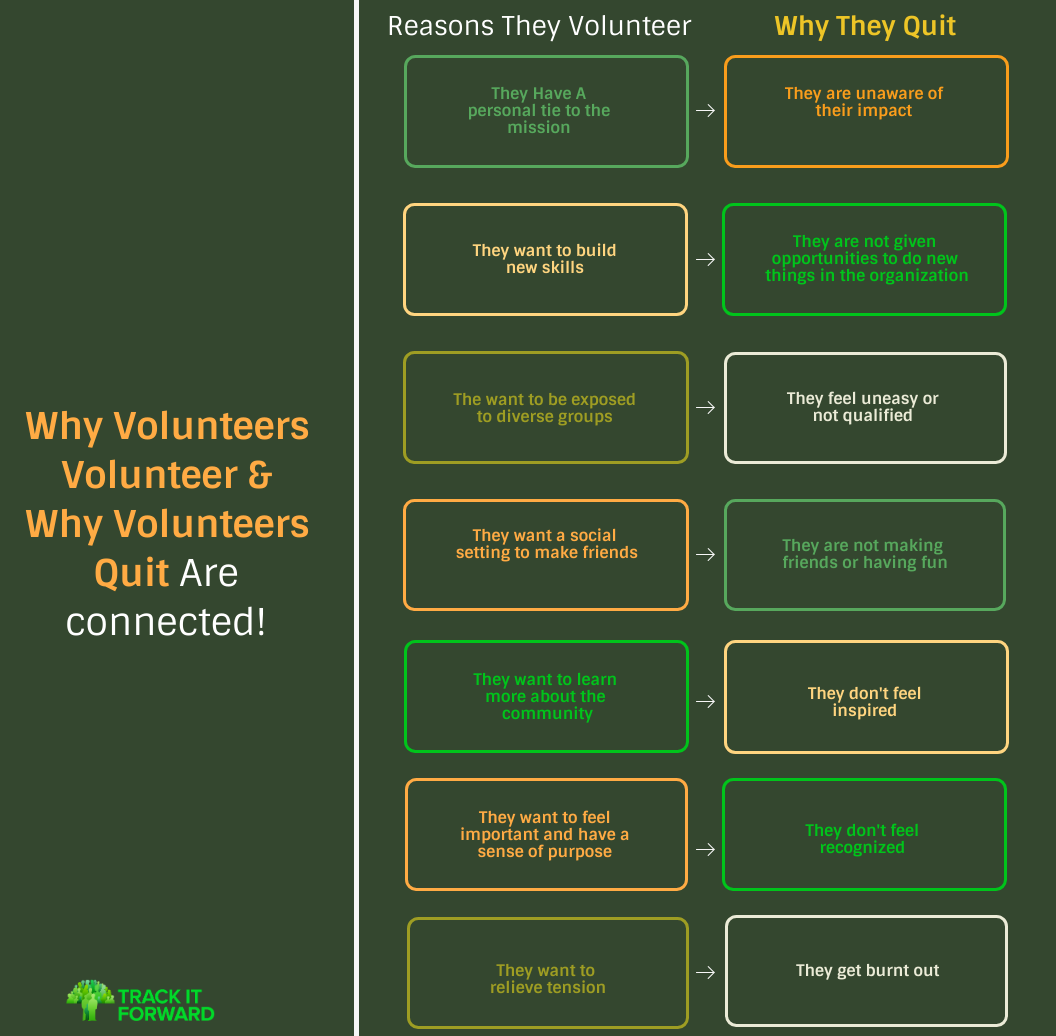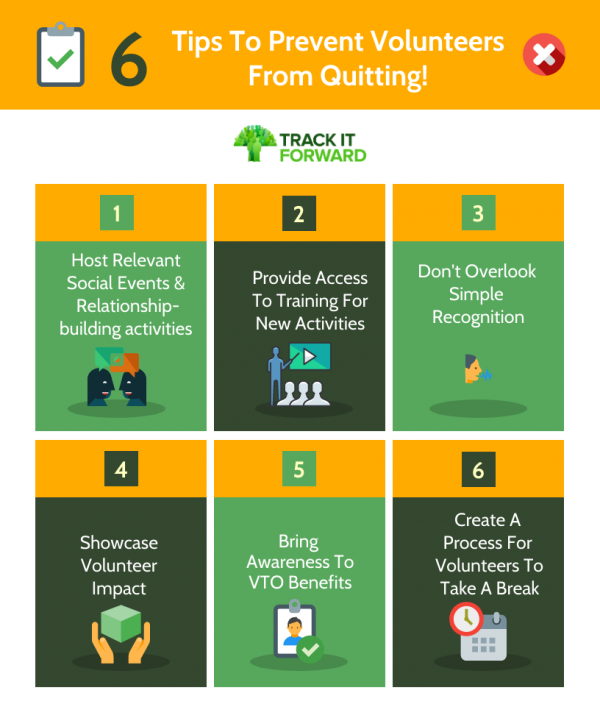The Real Lives of Volunteer Coordinators
A Blog for us to Learn from Each Other
Younger volunteers are usually pretty motivated to volunteer because they have some sort of requirement to meet or something to be striving for. Older volunteers usually do not have these motivators, which makes it harder for them to continue volunteering when they get busy.
In order to figure out why your volunteers quit and how to prevent them from quitting, you need to understand why they are volunteering in the first place. It all goes back to this. If they are not meeting their personal goal or expectations from volunteering, they might quit or feel unmotivated - which causes them to quit.
Every volunteer is different for why they are volunteering, so it is important to combine the volunteer’s goals and interests to create one hodgepodge of volunteer programs.
Sounds difficult right? We know!
We are going to walk you through the reasons volunteers may be volunteering, why they might quit, and how to prevent this from happening and keeping the volunteers motivated!

Top Reasons Adults Volunteer
1. They have a personal tie to the mission
If volunteers are very concerned about the mission your organization supports, they are going to want to volunteer to feel more connected to that mission. A lot of volunteers are connected in many ways to the philanthropic side to volunteering and this helps them feel as though they are doing their part.
2. Skill Building
Everyone wants to be well-adversed in a multitude of activities and skills. Adults might be trying to build their resume or just expose themselves to new things. Volunteering is usually a very harmless way to do this!
3. They would like to involve themselves with diverse groups of people
Sometimes people just want to get out of their comfort zone and their friend group. Volunteering is a great way to be involved with people you might not otherwise meet in a normal circumstance.
4. To be social and make friends
Similarly, people might volunteer to try to make friends. We know that people who are volunteering are generally good people, so why not volunteer for something that is going to do good for a community and try to make friends at the same time!
5. To learn more about the community
Volunteering is a different perspective on the community in which people live. It helps individuals see the community in a different light, which allows them to gain a better knowledge base of where they live.
6. To feel important and motivated beyond their jobs
A lot of people like having a purpose in life and for some people, their life and family are not their purpose. These people think that volunteering towards something is showing their impact on the world, and they just want to have a better sense of purpose with volunteering!
7. They want to relieve tension
Volunteering is a great mental health activity, there are many studies that show it! So, for some people volunteering may be a form of self-care and a great way for people to reset their mindset.
Top Reasons Volunteers Quit
1. They don’t feel inspired
Volunteers often quite because they just aren’t interested in what they are doing. They don’t see their impact, they don’t see the mission as necessary or important, and they feel like they are just one in a few people doing something.
If volunteers aren’t looking forward to volunteering, they might quit.
2. They aren’t making friends or having fun
Those volunteers who want it to be a social setting, but aren’t getting that will probably quit. Even those who volunteer and are shy probably want a social setting. It is your job to make the volunteering fun for them and to help them get past the awkwardness.
If volunteers don’t feel friendliness or feel ostracized, they might quit.
3. They feel uneasy or not qualified
No one wants to feel uneducated about their role as a volunteer, this will make people wildly uncomfortable. Be sure to educate volunteers fully on their roles, the tasks they have to do, and give them time to learn. You can do this through orientations and info sessions very easily.
If volunteers are not sure what they should be doing, they might quit.
4. They do not feel recognized
Volunteers are putting their free time into projects and tasks. Sometimes, it might be a lot harder or take longer than they anticipated. If they don’t feel like anyone notices their hard work, they might not feel like they are actually doing anything meaningful.
If volunteers don’t feel important, they might quit.
5. They are unaware of their impact
Those who volunteer for the mission or because they want to have a sense of purpose and impact need to be shown how what they are doing has a direct or indirect impact on the mission. If not, the whole reason they are volunteering is not validated.
If volunteers cannot see their impact, they might quit.
6. They are not given opportunities to do new things in the organization
Volunteering can get monotonous if not varied. Volunteers often get stuck in a rut of signing up for the same tasks because they know how to do them. But if you allow volunteers to do new tasks they will get exposed to new things and learn new skills.
If volunteers feel forced to do the same tasks over and over, they might quit.
7. They get burnt out
Sometimes volunteers commit themselves too much. While this might be great for you to have volunteers, you need to keep in mind that it might not be great in the long run. Volunteers can over-commit and it is okay for them to have breaks.
If volunteers feel pressured to volunteer, they might burn out and quit.
How To Prevent Volunteers From Quitting & Keep Volunteers Motivated
We all know that adults have plenty of tasks and personal things to worrry about, so it is easy to understand why when things get tough or busy, it might not be their priority to volunteer. But, if you make your volunteer program a safe space and a place that combines all of the reasons why someone would want to volunteer - then you have a great environment that will be more likely to prevent volunteers from quitting!
Volunteers usually get involved to create an impact, but the reason they stay is really tied to what they want in their life at the moment. Unfortunately, they don’t typically communicate these reasons either! Here are some fun tips to prevent volunteers from quitting & keeping them motivated.

Host relevant social events & relationship-building activities
Most adult volunteers are usually too busy with family and work to have their ideal social life. But volunteering is a great way to meet like-minded people, and if they like the people, they’ll love volunteering. There’s a quote I definitely live by: “True happiness doesn’t come from what you do, but from you who do it with.” And that quote definitely applies to adult volunteers. If you’re not organizing social events, you should be, and when you do organize one, don’t just throw one together. Find out what kind of social events your volunteers would like to participate in to build closer bonds with one another.
Remember, for these events you might have to be a moderator and a host, but this is all part of providing a safe and social place for your volunteers, which might make them have more fun and prevent them from quitting their volunteer role!
Provide access to training for new activities
Make sure volunteers feel able to sign up for different activities, and well-trained. You can offer training sessions for different volunteer initiatives and activities monthly and have people sign up for them. This will help them express their interest in doing different activities, as well as feel trained to do them when the time comes! Always push volunteers to try new things, but remember this isn’t for everyone.
When new opportunities are presented to volunteers, they might feel more comfortable to try new things, this will help them feel motivated and prevent them from quitting due to burn out!
Don’t overlook simple recognition
Most adults don’t volunteer just to be recognized, but no one ever turns away or detests recognition. Get used to recognizing volunteers on a regular basis, whether it be quarterly or monthly. If you’re tracking hours, let the volunteers see a leaderboard of all the work of the top volunteers. If you really want to make an impact, pick one of the top leaderboard volunteers and do an article about them, about what makes them tick, about their own personal narrative. This may sound like a no-brainer, but it’s hardly done and when it is done, the positive impact is massive.
A very easy way to keep volunteers motivated is through hour tracking. If you have a volunteer time tracking system like Track It Forward, you will be able to easily see who is doing a lot in your organization, and who might need to be motivated a bit more.
Showcase Volunteer Impact
This might sound hard to do, but it is probably something that you are already familiar with doing! Show volunteers what your program has been doing with the things they are creating, the money they have raised, and the other activities you have had volunteers do!
This can be done by sharing organization-wide goals with the organization and how close you are to reaching it, or even with each volunteer activity- tell them why that activity is important. If you have an event calendar, in the descriptions of the volunteer event, you can let them know why this is needed!
Adult volunteers are smart, they like to be in the know, and this is something that you can do to prevent volunteers from quitting AND motivate them to volunteer at the same time!
Bring awareness to VTO benefits
You've probably heard of PTO (Paid Time Off), but there is also VTO (Volunteer Time Off) that more and more employers are providing. However, it can sometimes take a bit of time for an employee to connect these dots and realize this benefit is available to them. If you can help bridge the information gap by educating your volunteers on VTO benefits and encouraging them to check if their employers have an existing policy, your team won't need to choose between their busy work schedule and their volunteer time, because they will be one in the same. Here's the best article I found online that describes the importance of VTO.
Create a Process For Volunteers To Take A Break
Sometimes, volunteers might be overwhelmed and want to quit, but if you provide them with an alternative that would still relieve their stress, this might urge them to come back when they are ready.
Do not guilt volunteers if they need to take a break from volunteer work. Sometimes, they just have too much going on, we’ve all been there. Provide a secure process to put volunteers on “break” and ask them when they would like to hear from you again, or if they still want to be informed, but won’t be signing up for events at the moment.
If you encourage volunteers that this is okay, you might be able to see why they are taking a break, keep in touch, and still have them come back. If volunteers are comfortable coming to you when they feel burnt out or need a break, you can still have a relationship with them and motivate them to come back when they are ready! Then, this isnt a full-on quit, but an amicable break.
Volunteers quit, don’t take it too hard on yourself and your role. Just try to implement these tips and see why volunteers are there in the first place! This will nurture volunteers and silently encourage them to stay and keep volunteering!
 Written by
Written by